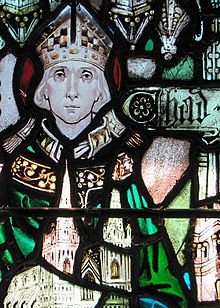St Chad
| Chad | |
|---|---|
| Bishop of York | |

Image of Chad in a stained glass window from Holy Cross Monastery, West Park, New York
|
|
| Appointed | 664 |
| Term ended | 669 |
| Predecessor | Paulinus |
| Successor | Wilfrid |
| Orders | |
| Consecration | 664 |
| Personal details | |
| Born |
c. 634 Northumbria |
| Died | 2 March 672 Lichfield, Staffordshire |
| Buried | Lichfield Cathedral |
| Sainthood | |
| Feast day | 2 March |
| Venerated in |
Catholic Church Anglican Communion Eastern Orthodox Church |
| Attributes | Bishop, holding a triple-spired cathedral (Lichfield) |
| Patronage | Mercia; Lichfield; of astronomers |
| Shrines |
|
Chad (Old English: Ceadda; died 2 March 672) was a prominent 7th century Anglo-Saxon churchman, who became abbot of several monasteries, Bishop of the Northumbrians and subsequently Bishop of the Mercians and Lindsey People. He was later canonised as a saint. He was the brother of Cedd, also a saint. He features strongly in the work of Bede the Venerable and is credited, together with Cedd, with introducing Christianity to the Mercian kingdom.
Most of our knowledge of Chad comes from the writings of Bede. Bede tells us that he obtained his information about Chad and his brother, Cedd, from the monks of Lastingham, where both were abbots. Bede gives this attribution great prominence, placing it in the introduction to his work. This may indicate that the brothers had become controversial figures: certainly Bede must have thought that his material about them would be of more than usual interest to the reader. Bede also refers to information he received from Trumbert, "who tutored me in the Scriptures and who had been educated in the monastery by that master", i.e. Chad. In other words, Bede considered himself to stand in the spiritual lineage of Chad and had gathered information from at least one who knew him personally.
Chad was one of four brothers, all active in the Anglo-Saxon church. The others were Cedd, Cynibil and Caelin. Chad seems to have been Cedd's junior, arriving on the political scene about ten years after Cedd. It is reasonable to suppose that Chad and his brothers were drawn from the Northumbrian nobility: They certainly had close connections throughout the Northumbrian ruling class. However, the name Chad is actually of British Celtic, rather than Anglo-Saxon origin. It is an element found in the personal names of many Welsh princes and nobles of the period and signifies "battle". This may indicate a family of mixed cultural and/or ethnic background, with roots in the original Celtic population of the region.
...
Wikipedia
